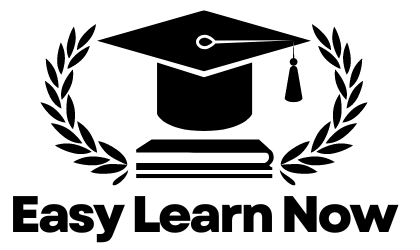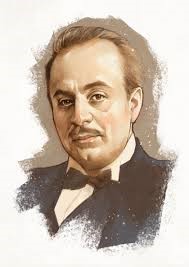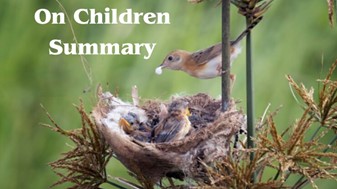2nd PUC English Question and Answer – On Children
Looking for 2nd PUC English textbook answers? You can download Chapter 3: On Children Questions and Answers PDF, Notes, and Summary here. 2nd PUC English solutions follow the Karnataka State Board Syllabus, making it easier for students to revise and score higher in exams.
Karnataka 2nd PUC English Textbook Answers—Reflections Chapter 3
On Children Questions and Answers, Notes, and Summary
2nd PUC English Chapter 3
On Children
Scroll Down to Download On Children PDF
On Children Comprehension I.
Question 1.
In the statement, “And a woman who held a babe against her bosom said, ‘Speak to us of Children,’” the term “he” refers to:
(a) her child.
(b) the Prophet.
(c) the poet.
Answer:
(b) the Prophet.
Question 2.
The phrase “Your children are not your children” means:
(a) they do not belong solely to their parents.
(b) the children should have their own space.
(c) parents should not be possessive of their children.
Answer:
(c) parents should not be possessive of their children.
Question 3.
The phrase “They come through you, but are not from you” means:
(a) although parents give birth to their children, they do not own them.
(b) children have independent personalities.
(c) parents should be indifferent to their children.
Answer:
(a) although parents give birth to their children, they do not own them.
Question 4.
According to the Prophet, what may be given to children?
Answer:
According to the Prophet, only our love may be given to children.
Question 5.
The phrase “their souls dwell in the house of tomorrow” means:
(a) children belong to the future.
(b) parents cannot shape their children’s future.
(c) children have a different vision of life.
Answer:
(a) children belong to the future.
Question 6.
“The bows” and “living arrows” refer to:
Answer:
Parents and children.
Question 7.
In the phrase “For even as He loves the arrow that flies, so He loves also the bow that is stable,” discuss the contrast between the underlined words.
Answer:
The Prophet indicates that the term “flies” symbolizes the future. He advises parents not to be overly concerned about their children’s future, as it is ultimately in God’s hands. In contrast, the word “stable” represents parents who have already accomplished their goals with divine assistance. Just as parents have achieved their aspirations, their children will also reach theirs in due time. Therefore, the Prophet encourages parents not to be overly possessive regarding their children.
Question 8.
When the Prophet says, “Your children are not your children,” whose children is he referring to?
(a) God
(b) Neighbors
(c) Parents
Answer:
(a) God
On Children Comprehension II.
Question 1.
Why does the Prophet categorically state, “Your children are not your children”?
Answer:
The Prophet asserts that children are not truly the property of their parents because, once born, each child possesses their own individuality and is not bound to the preferences of their parents. While parents provide love and support, children ultimately choose their own paths and professions according to their own desires.
As they grow, they marry and settle down based on their preferences, not solely their parents’ wishes. Although children come into the world through their parents, their lives and choices are guided by a higher power, emphasizing that they play roles determined by God.
Question 2.
What do the metaphors “bows” and “arrows” signify about the parent-child relationship?
Answer:
The metaphors “bows” and “arrows” represent the relationship between parents and children. In this context, the “bow” symbolizes parents, while the “arrows” symbolize children. God uses parents as bows to bring children into the world. When the bow releases an arrow, it does not determine its direction based on its own strength; rather, it follows the guidance of the one who handles the bow—God.
Thus, God directs the “arrows” (children) according to His will. This concept resonates with Shakespeare’s quote that life is a drama, and we are merely actors, suggesting that while parents play a crucial role, the ultimate guidance comes from a higher power.
Question 3.
According to the Prophet, what attitude should parents have towards their children?
Answer:
The Prophet advises parents against being overly possessive about their children, urging them to allow their children the freedom to explore their own paths and pursue their dreams. Parents should recognize that they are not the sole well-wishers of their children; God, who created them, also plays a significant role in their lives. Overindulgence can lead to detrimental consequences, as pampering may spoil children.
To illustrate this point, the Prophet uses the example of a bonsai tree, which, despite receiving excessive care, remains small and cannot provide shade. In contrast, a tree that grows freely in sunlight, wind, and rain becomes tall and wide, offering shade to many. Therefore, children should be nurtured with the freedom to grow independently, enabling them to live according to their own wishes and contribute positively to others.
On Children Comprehension III.
Question 1.
In this poem, “parents” could stand as a metaphor for:
(a) the older generation.
(b) leaders.
(c) religious heads.
(d) teachers.
Answer:
(a) the older generation.
Question 2.
In light of the poem, consider the different levels of freedom children must have in shaping their lives.
Answer:
The future of a child is not determined by parents but by the children themselves. When children are given the freedom to make their own choices and decisions, they can pursue their paths and achieve remarkable things. Conversely, if parents impose their preferences on children, it can hinder their progress and increase the risk of failure.
When children are allowed to explore freely, they tend to think creatively, which can benefit society and lead to innovative discoveries for the world. Therefore, parents should recognize and support their children’s interests, encouraging them in their pursuits. This supportive relationship fosters growth and helps children reach their goals. Parents should strive to be friends with their children, understanding their needs and aspirations rather than forcing them into paths that do not align with their passions.
Question 3.
The poem does not focus merely on the lives of children but also addresses the responsibility of parents. Discuss.
Answer:
The poem is highly relevant in today’s society, where parents can be overly possessive in shaping their children’s futures. Taken from Kahlil Gibran’s work “The Prophet,” it features a conversation in which a mother asks the Prophet to speak about children.
The Prophet emphasizes that parents should not regard their children as their own because God is the ultimate creator, and parents are merely vessels through which life continues. While children are born of their parents, they possess their own individualities, desires, and passions. Parents can provide love and affection, but they cannot impose their own thoughts and ideas on their children.
The Prophet states that parents nourish the body but cannot dictate the souls, minds, and hearts of their children.
Additionally, the poem highlights the universal generation gap, illustrating that what parents create becomes outdated while children bring forth new ideas. Life, according to the Prophet, always moves forward, never backwards.
The metaphor of “bows and arrows” compares parents to bows and children to arrows, with God as the archer guiding both. God uses parents for the creation of future generations, loving both the bows and the arrows equally. Ultimately, the Prophet advises parents to avoid possessiveness and to allow their children the freedom to shape their own lives.
On Children Additional Questions and Answers
Question 1.
In the line “The Archer sees the mark upon the path of the infinite, and he bends you with his might that his arrows may go swift and far,” the archer refers to:
(a) Parents
(b) Children
(c) God
Answer:
(c) God
Question 2.
What does the poet mean by “For life goes not backward nor tarries with Yesterday”?
Answer:
The poet conveys that life does not revisit the past and does not pause to dwell on it.
Question 3.
In the phrase “For souls dwell in the house of tomorrow,” the term “House of Tomorrow” refers to:
(a) Hell
(b) Heaven
(c) Future
Answer:
(c) Future
On Children Summary in English
The poem is particularly relevant in today’s society, where parents often become overly possessive in shaping their children’s goals. Extracted from Kahlil Gibran’s work “The Prophet,” the poem has also been translated into Kannada by Dr. Prabhushankar.
Presented as a conversation, the poem begins with a mother asking the Prophet to speak about children. The Prophet emphasizes that parents should not view their children as their own, as God is the ultimate creator, and parents are merely actors fulfilling God’s will.
While children are born of their parents, they possess their own individualities, desires, passions, and preferences. The Prophet asserts that even though children live with their parents, they do not truly belong to them. Parents can provide love and affection but cannot impose their thoughts or ideas, as children have their own perspectives.
The Prophet makes it clear that parents can nourish the body, but they cannot dictate the souls, minds, or hearts of their children. The future of children is beyond the control of their parents, even in their dreams. The poem highlights the universal generation gap: what parents create becomes outdated, while what children pursue is new. Life, the Prophet reminds us, always moves forward and never returns to the past.
He uses the metaphor of “bows and arrows” to illustrate this relationship, comparing parents to bows and children to arrows. God, as the archer, guides both the bows and the arrows, using parents to help create future generations. God loves both parents and children equally, without discrimination.
Ultimately, the Prophet advises parents to avoid possessiveness and to allow their children the freedom to shape their own lives.


